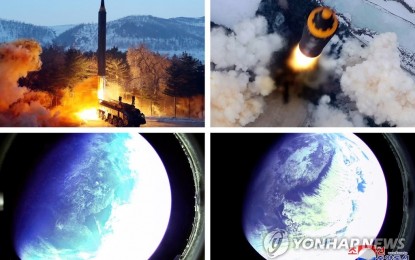
MISSILE TEST FIRE. This composite photo, released by North Korea's official Korean Central News Agency, shows its intermediate-range ballistic missile, Hwasong-12, being launched on Jan. 30, 2022. North Korea previously shot it in September 2017. (Yonhap photo)
SEOUL – North Korea announced Monday it test-fired a Hwasong-12 "intermediate and long-range" ballistic missile the previous day. The accuracy of the weapons system "being produced and deployed" has been confirmed, according to Pyongyang's state media.
"The evaluation test-fire of Hwasong 12-type ground-to-ground intermediate- and long-range ballistic missile was conducted Sunday under a plan of the Academy of Defense Science, the Second Economy Commission and other institutions concerned," the North's official Korean Central News Agency (KCNA) said in its English-language report.
The launch was aimed to "selectively evaluate the missile being produced and deployed and to verify the overall accuracy of the weapon system," it added. "It confirmed the accuracy, security and effectiveness of the operation of the Hwasong 12-type weapon system under production."
North Korean leader Kim Jong-un did not attend the firing.
The "highest-angle launch system" was used in consideration of the security of neighboring nations, the KCNA reported, without providing other flight details in the five-paragraph report.
The KCNA then released photos of the missile being launched from a transporter erector launcher (TEL), along with an image of the Earth taken from space by a camera installed in the missile warhead.
The Hwasong-12 is classified as an intermediate-range ballistic missile (IRBM) with a range of 3,000-5,500 kilometers by the South Korean and US military authorities. The North previously shot it in September 2017.
South Korea's military said the latest missile, fired from the Jagang province bordering China, flew about 800 km at a top altitude of 2,000 km before landing in the East Sea.
Sunday's launch marked the unpredictable North's seventh show of force this year and its longest-range missile test since the test-firing of an intercontinental ballistic missile (ICBM) in November 2017.
The latest launch came just three days after the North fired two "surface-to-surface tactical guided missiles" toward the East Sea, which followed Pyongyang's test-firing of two apparent cruise missiles two days earlier.
It conducted four other launches earlier this month, including those of what it claimed to be hypersonic missiles.
It marks the most projectiles the North has fired in a single month since Kim took power in late 2011. The North carried out six projectile launches in both March and July 2014.
President Moon Jae-in presided over a rare plenary session of the National Security Council, the first in about a year, on Sunday. He said the North was seen as inching closer to scrapping its self-imposed moratorium on its nuclear and ICBM tests.
Earlier this month, Pyongyang made a veiled threat to lift the yearslong moratorium, as Washington has stepped up sanctions pressure on its regime amid a protracted deadlock in their nuclear talks.
Experts say the Hwasong-12 launch signals that the North may be on the cusp of lifting the moratorium.
"A fresh nuclear or ICBM test now seems like a matter of time," Lim Eul-chul, a professor at the Institute for Far Eastern Studies, said. "The North is expected to continue with more military activities to pressure the US, without seriously taking into account external factors, such as the Beijing Olympics or the upcoming presidential election in South Korea."
In Washington, a senior Biden administration official reportedly expressed concerns over Pyongyang's possible resumption of nuclear and long-range missile testing.
"We believe it is completely appropriate and completely correct to start having some serious discussions," the unnamed official was quoted as saying by Reuters on Sunday (Washington time).
US Department of Defense press secretary John Kirby also said Washington was "laser focused on the challenges to the Korean Peninsula coming out of Pyongyang," and vowed to stay "ready militarily on the peninsula and in the region." (Yonhap)
